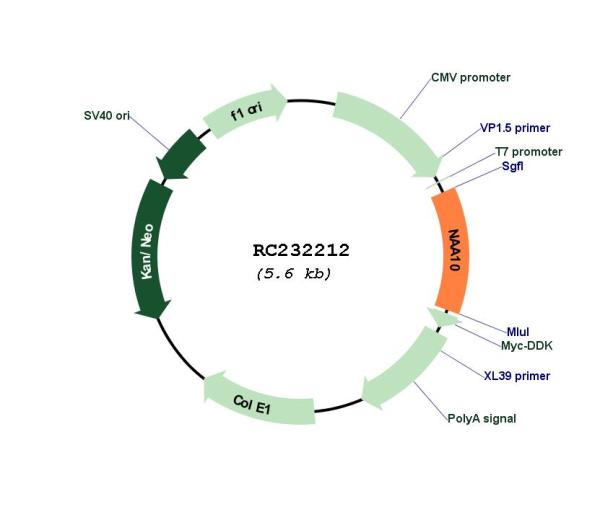ARD1A (NAA10) (NM_001256120) Human Tagged ORF Clone
CAT#: RC232212
- TrueORF®
NAA10 (Myc-DDK tagged) - Homo sapiens N(alpha)-acetyltransferase 10, NatA catalytic subunit (NAA10), transcript variant 3
ORF Plasmid: tGFP
"NM_001256120" in other vectors (2)
USD 198.00
Specifications
| Product Data | |
| Type | Human Tagged ORF Clone |
| Tag | Myc-DDK |
| Symbol | ARD1A |
| Synonyms | ARD1; ARD1A; ARD1P; DXS707; hARD1; MCOPS1; NATD; OGDNS; TE2 |
| Vector | pCMV6-Entry |
| E. coli Selection | Kanamycin (25 ug/mL) |
| Mammalian Cell Selection | Neomycin |
| Sequence Data |
>RC232212 representing NM_001256120
Red=Cloning site Blue=ORF Green=Tags(s) TTTTGTAATACGACTCACTATAGGGCGGCCGGGAATTCGTCGACTGGATCCGGTACCGAGGAGATCTGCC GCCGCGATCGCC ATGAACATCCGCAATGCGAGGCCAGAGGACCTAATGAACATGCAGCACTGCAACCTCCTCTGCCTGCCCG AGAACTACCAGATGAAATACTACTTCTACCATGGCCTTTCCTGGCCCCAGCTCTCTTACATTGCTGAGGA CGAGAATGGGAAGATTGTGGGGGAAGAGGACCCAGATGATGTGCCCCATGGACATATCACCTCATTGGCT GTGAAGCGTTCCCACCGGCGCCTCGGTCTGGCTCAGAAACTGATGGACCAGGCCTCTCGAGCCATGATAG AGAACTTCAATGCCAAATATGTCTCCCTGCATGTCAGGAAGAGTAACCGGGCCGCCCTGCACCTCTATTC CAACACCCTCAACTTTCAGATCAGTGAAGTGGAGCCCAAATACTATGCAGATGGGGAGGACGCCTATGCC ATGAAGCGGGACCTCACTCAGATGGCCGACGAGCTGAGGCGGCACCTGGAGCTGAAAGAGAAGGGCAGGC ACGTGGTGCTGGGTGCCATCGAGAACAAGGTGGAGAGCAAAGGCAATTCACCTCCGAGCTCAGGAGAGGC CTGTCGCGAGGAGAAGGGCCTGGCTGCCGAGGATAGTGGTGGGGACAGCAAGGACCTCAGCGAGGTCAGC GAGACCACAGAGAGCACAGATGTCAAGGACAGCTCAGAGGCCTCCGACTCAGCCTCC ACGCGTACGCGGCCGCTCGAGCAGAAACTCATCTCAGAAGAGGATCTGGCAGCAAATGATATCCTGGATT ACAAGGATGACGACGATAAGGTTTAA >RC232212 representing NM_001256120
Red=Cloning site Green=Tags(s) MNIRNARPEDLMNMQHCNLLCLPENYQMKYYFYHGLSWPQLSYIAEDENGKIVGEEDPDDVPHGHITSLA VKRSHRRLGLAQKLMDQASRAMIENFNAKYVSLHVRKSNRAALHLYSNTLNFQISEVEPKYYADGEDAYA MKRDLTQMADELRRHLELKEKGRHVVLGAIENKVESKGNSPPSSGEACREEKGLAAEDSGGDSKDLSEVS ETTESTDVKDSSEASDSAS TRTRPLEQKLISEEDLAANDILDYKDDDDKV |
| Restriction Sites |
SgfI-MluI
Cloning Scheme for this gene
Plasmid Map

|
| ACCN | NM_001256120 |
| ORF Size | 687 bp |
| OTI Disclaimer | The molecular sequence of this clone aligns with the gene accession number as a point of reference only. However, individual transcript sequences of the same gene can differ through naturally occurring variations (e.g. polymorphisms), each with its own valid existence. This clone is substantially in agreement with the reference, but a complete review of all prevailing variants is recommended prior to use. More info |
| OTI Annotation | This clone was engineered to express the complete ORF with an expression tag. Expression varies depending on the nature of the gene. |
| Product Components | The ORF clone is ion-exchange column purified and shipped in a 2D barcoded Matrix tube containing 10ug of transfection-ready, dried plasmid DNA (reconstitute with 100 ul of water). |
| Reconstitution | 1. Centrifuge at 5,000xg for 5min. 2. Carefully open the tube and add 100ul of sterile water to dissolve the DNA. 3. Close the tube and incubate for 10 minutes at room temperature. 4. Briefly vortex the tube and then do a quick spin (less than 5000xg) to concentrate the liquid at the bottom. 5. Store the suspended plasmid at -20°C. The DNA is stable for at least one year from date of shipping when stored at -20°C. |
| Reference Data | |
| RefSeq | NM_001256120.2 |
| RefSeq Size | 1118 bp |
| RefSeq ORF | 690 bp |
| Locus ID | 8260 |
| Cytogenetics | Xq28 |
| Protein Families | Druggable Genome |
| Protein Pathways | Glycerophospholipid metabolism, Limonene and pinene degradation, Phenylalanine metabolism, Tyrosine metabolism |
| MW | 26.2 kDa |
| Gene Summary | N-alpha-acetylation is among the most common post-translational protein modifications in eukaryotic cells. This process involves the transfer of an acetyl group from acetyl-coenzyme A to the alpha-amino group on a nascent polypeptide and is essential for normal cell function. This gene encodes an N-terminal acetyltransferase that functions as the catalytic subunit of the major amino-terminal acetyltransferase A complex. Mutations in this gene are the cause of Ogden syndrome. Alternate splicing results in multiple transcript variants. [provided by RefSeq, Jan 2012] |
Documents
| Product Manuals |
| FAQs |
| SDS |
Resources
Other Versions
| SKU | Description | Size | Price |
|---|---|---|---|
| RG232212 | NAA10 (tGFP-tagged) - Homo sapiens N(alpha)-acetyltransferase 10, NatA catalytic subunit (NAA10), transcript variant 3 |
USD 530.00 |
|
| SC330367 | NAA10 (untagged) - Homo sapiens N(alpha)-acetyltransferase 10, NatA catalytic subunit (NAA10), transcript variant 3 |
USD 330.00 |
{0} Product Review(s)
Be the first one to submit a review






























































































































































































































































 Germany
Germany
 Japan
Japan
 United Kingdom
United Kingdom
 China
China


